BMA735 Essay: Moral Judgment, Business Ethics, and Management
VerifiedAdded on 2023/01/20
|9
|2722
|90
Essay
AI Summary
This essay delves into the complex relationship between the psychology of moral judgment and normative approaches to business ethics. It addresses the question of whether psychological understandings of moral judgment render normative approaches obsolete, arguing instead that they are complementary. The essay examines how moral judgment fosters transparency, honesty, and discipline within organizations, similar to business ethics. It highlights the crucial role of both in governing employee relations, promoting trust, and encouraging collaboration. Furthermore, it explores how moral philosophy and business ethics influence an organization's public image and corporate social responsibility, emphasizing the importance of ethical conduct for long-term success. The conclusion reinforces that moral judgment and business ethics are interconnected, both essential for ethical decision-making, positive organizational culture, and responsible business practices.
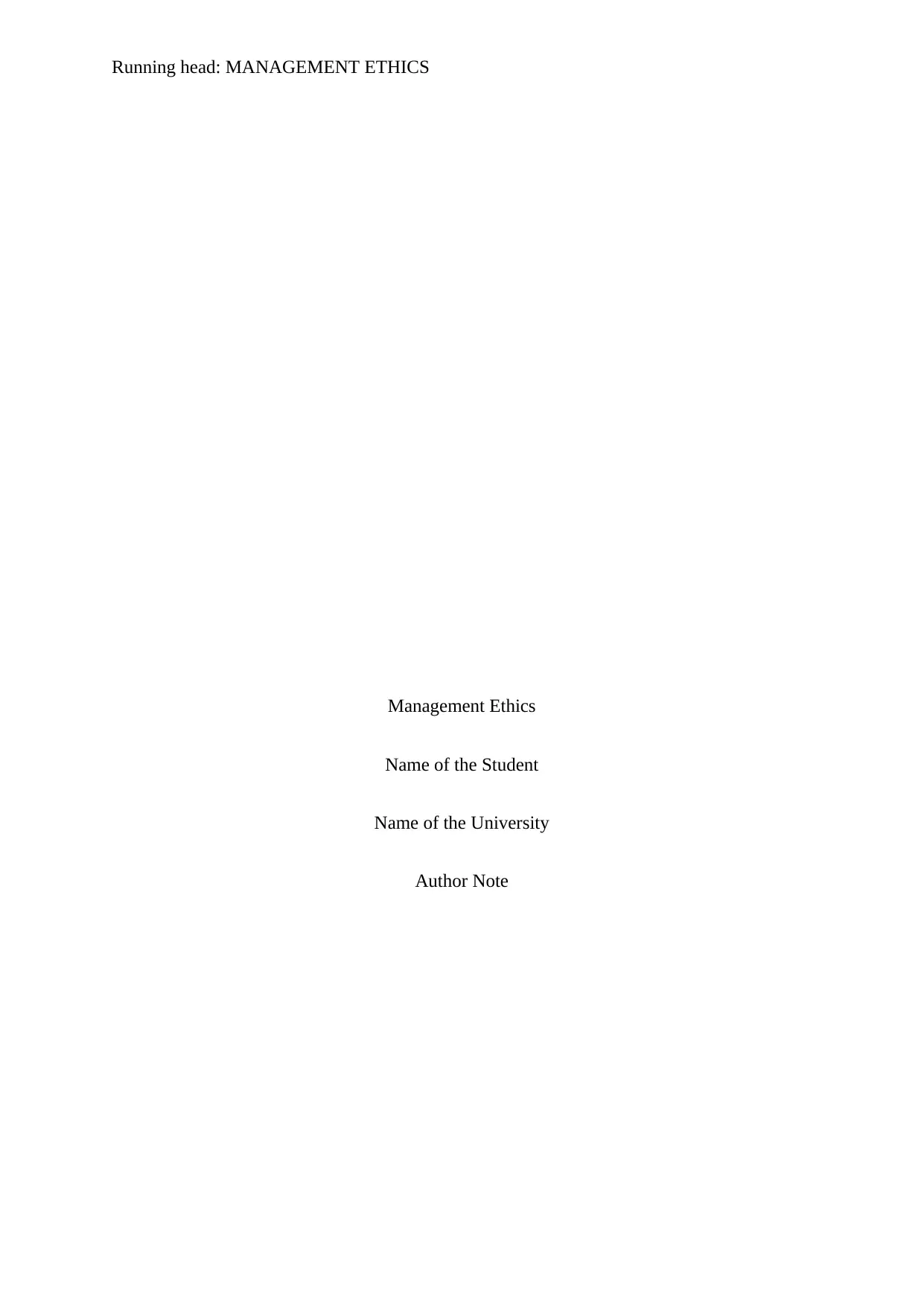
Running head: MANAGEMENT ETHICS
Management Ethics
Name of the Student
Name of the University
Author Note
Management Ethics
Name of the Student
Name of the University
Author Note
Paraphrase This Document
Need a fresh take? Get an instant paraphrase of this document with our AI Paraphraser
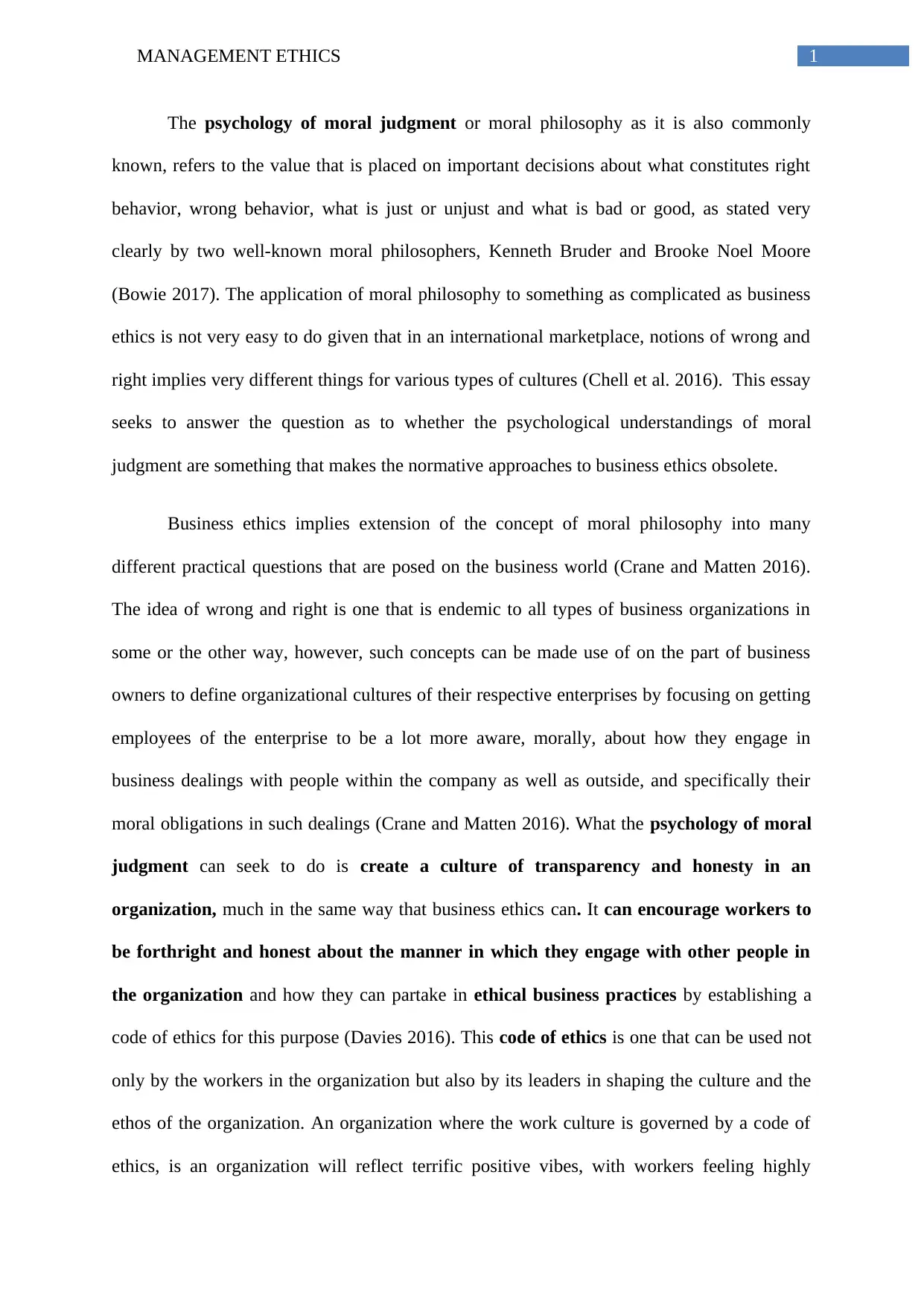
1MANAGEMENT ETHICS
The psychology of moral judgment or moral philosophy as it is also commonly
known, refers to the value that is placed on important decisions about what constitutes right
behavior, wrong behavior, what is just or unjust and what is bad or good, as stated very
clearly by two well-known moral philosophers, Kenneth Bruder and Brooke Noel Moore
(Bowie 2017). The application of moral philosophy to something as complicated as business
ethics is not very easy to do given that in an international marketplace, notions of wrong and
right implies very different things for various types of cultures (Chell et al. 2016). This essay
seeks to answer the question as to whether the psychological understandings of moral
judgment are something that makes the normative approaches to business ethics obsolete.
Business ethics implies extension of the concept of moral philosophy into many
different practical questions that are posed on the business world (Crane and Matten 2016).
The idea of wrong and right is one that is endemic to all types of business organizations in
some or the other way, however, such concepts can be made use of on the part of business
owners to define organizational cultures of their respective enterprises by focusing on getting
employees of the enterprise to be a lot more aware, morally, about how they engage in
business dealings with people within the company as well as outside, and specifically their
moral obligations in such dealings (Crane and Matten 2016). What the psychology of moral
judgment can seek to do is create a culture of transparency and honesty in an
organization, much in the same way that business ethics can. It can encourage workers to
be forthright and honest about the manner in which they engage with other people in
the organization and how they can partake in ethical business practices by establishing a
code of ethics for this purpose (Davies 2016). This code of ethics is one that can be used not
only by the workers in the organization but also by its leaders in shaping the culture and the
ethos of the organization. An organization where the work culture is governed by a code of
ethics, is an organization will reflect terrific positive vibes, with workers feeling highly
The psychology of moral judgment or moral philosophy as it is also commonly
known, refers to the value that is placed on important decisions about what constitutes right
behavior, wrong behavior, what is just or unjust and what is bad or good, as stated very
clearly by two well-known moral philosophers, Kenneth Bruder and Brooke Noel Moore
(Bowie 2017). The application of moral philosophy to something as complicated as business
ethics is not very easy to do given that in an international marketplace, notions of wrong and
right implies very different things for various types of cultures (Chell et al. 2016). This essay
seeks to answer the question as to whether the psychological understandings of moral
judgment are something that makes the normative approaches to business ethics obsolete.
Business ethics implies extension of the concept of moral philosophy into many
different practical questions that are posed on the business world (Crane and Matten 2016).
The idea of wrong and right is one that is endemic to all types of business organizations in
some or the other way, however, such concepts can be made use of on the part of business
owners to define organizational cultures of their respective enterprises by focusing on getting
employees of the enterprise to be a lot more aware, morally, about how they engage in
business dealings with people within the company as well as outside, and specifically their
moral obligations in such dealings (Crane and Matten 2016). What the psychology of moral
judgment can seek to do is create a culture of transparency and honesty in an
organization, much in the same way that business ethics can. It can encourage workers to
be forthright and honest about the manner in which they engage with other people in
the organization and how they can partake in ethical business practices by establishing a
code of ethics for this purpose (Davies 2016). This code of ethics is one that can be used not
only by the workers in the organization but also by its leaders in shaping the culture and the
ethos of the organization. An organization where the work culture is governed by a code of
ethics, is an organization will reflect terrific positive vibes, with workers feeling highly
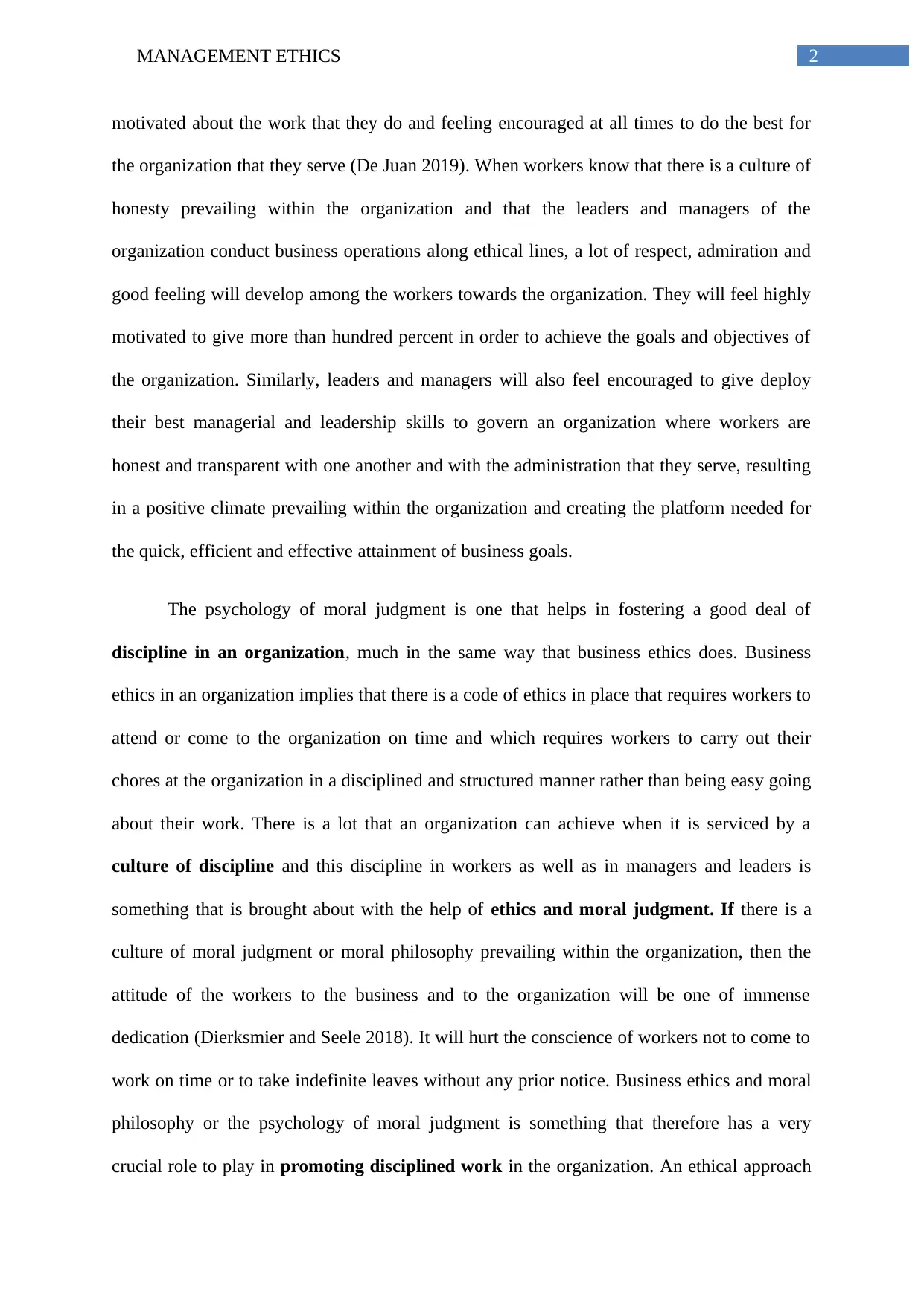
2MANAGEMENT ETHICS
motivated about the work that they do and feeling encouraged at all times to do the best for
the organization that they serve (De Juan 2019). When workers know that there is a culture of
honesty prevailing within the organization and that the leaders and managers of the
organization conduct business operations along ethical lines, a lot of respect, admiration and
good feeling will develop among the workers towards the organization. They will feel highly
motivated to give more than hundred percent in order to achieve the goals and objectives of
the organization. Similarly, leaders and managers will also feel encouraged to give deploy
their best managerial and leadership skills to govern an organization where workers are
honest and transparent with one another and with the administration that they serve, resulting
in a positive climate prevailing within the organization and creating the platform needed for
the quick, efficient and effective attainment of business goals.
The psychology of moral judgment is one that helps in fostering a good deal of
discipline in an organization, much in the same way that business ethics does. Business
ethics in an organization implies that there is a code of ethics in place that requires workers to
attend or come to the organization on time and which requires workers to carry out their
chores at the organization in a disciplined and structured manner rather than being easy going
about their work. There is a lot that an organization can achieve when it is serviced by a
culture of discipline and this discipline in workers as well as in managers and leaders is
something that is brought about with the help of ethics and moral judgment. If there is a
culture of moral judgment or moral philosophy prevailing within the organization, then the
attitude of the workers to the business and to the organization will be one of immense
dedication (Dierksmier and Seele 2018). It will hurt the conscience of workers not to come to
work on time or to take indefinite leaves without any prior notice. Business ethics and moral
philosophy or the psychology of moral judgment is something that therefore has a very
crucial role to play in promoting disciplined work in the organization. An ethical approach
motivated about the work that they do and feeling encouraged at all times to do the best for
the organization that they serve (De Juan 2019). When workers know that there is a culture of
honesty prevailing within the organization and that the leaders and managers of the
organization conduct business operations along ethical lines, a lot of respect, admiration and
good feeling will develop among the workers towards the organization. They will feel highly
motivated to give more than hundred percent in order to achieve the goals and objectives of
the organization. Similarly, leaders and managers will also feel encouraged to give deploy
their best managerial and leadership skills to govern an organization where workers are
honest and transparent with one another and with the administration that they serve, resulting
in a positive climate prevailing within the organization and creating the platform needed for
the quick, efficient and effective attainment of business goals.
The psychology of moral judgment is one that helps in fostering a good deal of
discipline in an organization, much in the same way that business ethics does. Business
ethics in an organization implies that there is a code of ethics in place that requires workers to
attend or come to the organization on time and which requires workers to carry out their
chores at the organization in a disciplined and structured manner rather than being easy going
about their work. There is a lot that an organization can achieve when it is serviced by a
culture of discipline and this discipline in workers as well as in managers and leaders is
something that is brought about with the help of ethics and moral judgment. If there is a
culture of moral judgment or moral philosophy prevailing within the organization, then the
attitude of the workers to the business and to the organization will be one of immense
dedication (Dierksmier and Seele 2018). It will hurt the conscience of workers not to come to
work on time or to take indefinite leaves without any prior notice. Business ethics and moral
philosophy or the psychology of moral judgment is something that therefore has a very
crucial role to play in promoting disciplined work in the organization. An ethical approach
⊘ This is a preview!⊘
Do you want full access?
Subscribe today to unlock all pages.

Trusted by 1+ million students worldwide
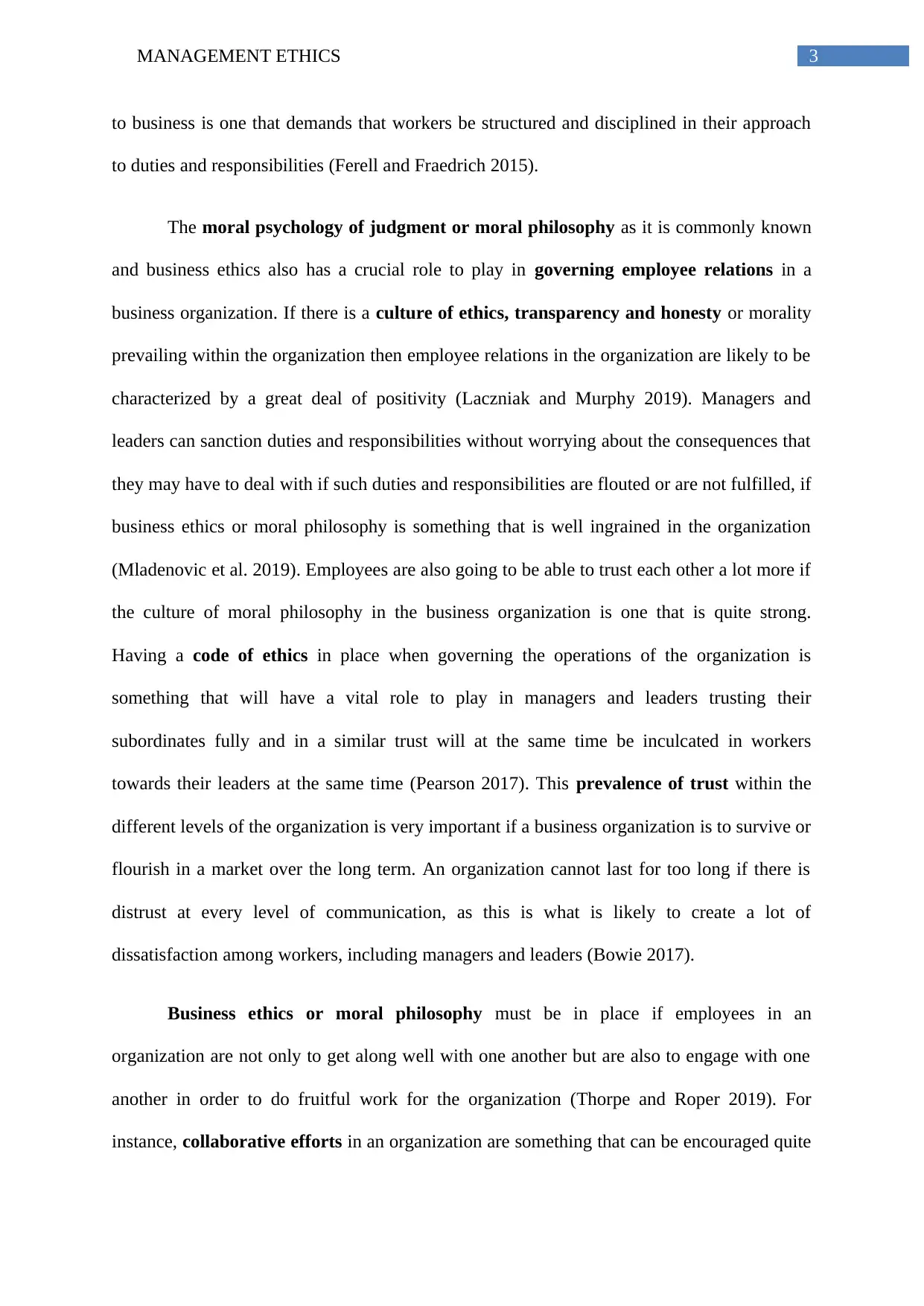
3MANAGEMENT ETHICS
to business is one that demands that workers be structured and disciplined in their approach
to duties and responsibilities (Ferell and Fraedrich 2015).
The moral psychology of judgment or moral philosophy as it is commonly known
and business ethics also has a crucial role to play in governing employee relations in a
business organization. If there is a culture of ethics, transparency and honesty or morality
prevailing within the organization then employee relations in the organization are likely to be
characterized by a great deal of positivity (Laczniak and Murphy 2019). Managers and
leaders can sanction duties and responsibilities without worrying about the consequences that
they may have to deal with if such duties and responsibilities are flouted or are not fulfilled, if
business ethics or moral philosophy is something that is well ingrained in the organization
(Mladenovic et al. 2019). Employees are also going to be able to trust each other a lot more if
the culture of moral philosophy in the business organization is one that is quite strong.
Having a code of ethics in place when governing the operations of the organization is
something that will have a vital role to play in managers and leaders trusting their
subordinates fully and in a similar trust will at the same time be inculcated in workers
towards their leaders at the same time (Pearson 2017). This prevalence of trust within the
different levels of the organization is very important if a business organization is to survive or
flourish in a market over the long term. An organization cannot last for too long if there is
distrust at every level of communication, as this is what is likely to create a lot of
dissatisfaction among workers, including managers and leaders (Bowie 2017).
Business ethics or moral philosophy must be in place if employees in an
organization are not only to get along well with one another but are also to engage with one
another in order to do fruitful work for the organization (Thorpe and Roper 2019). For
instance, collaborative efforts in an organization are something that can be encouraged quite
to business is one that demands that workers be structured and disciplined in their approach
to duties and responsibilities (Ferell and Fraedrich 2015).
The moral psychology of judgment or moral philosophy as it is commonly known
and business ethics also has a crucial role to play in governing employee relations in a
business organization. If there is a culture of ethics, transparency and honesty or morality
prevailing within the organization then employee relations in the organization are likely to be
characterized by a great deal of positivity (Laczniak and Murphy 2019). Managers and
leaders can sanction duties and responsibilities without worrying about the consequences that
they may have to deal with if such duties and responsibilities are flouted or are not fulfilled, if
business ethics or moral philosophy is something that is well ingrained in the organization
(Mladenovic et al. 2019). Employees are also going to be able to trust each other a lot more if
the culture of moral philosophy in the business organization is one that is quite strong.
Having a code of ethics in place when governing the operations of the organization is
something that will have a vital role to play in managers and leaders trusting their
subordinates fully and in a similar trust will at the same time be inculcated in workers
towards their leaders at the same time (Pearson 2017). This prevalence of trust within the
different levels of the organization is very important if a business organization is to survive or
flourish in a market over the long term. An organization cannot last for too long if there is
distrust at every level of communication, as this is what is likely to create a lot of
dissatisfaction among workers, including managers and leaders (Bowie 2017).
Business ethics or moral philosophy must be in place if employees in an
organization are not only to get along well with one another but are also to engage with one
another in order to do fruitful work for the organization (Thorpe and Roper 2019). For
instance, collaborative efforts in an organization are something that can be encouraged quite
Paraphrase This Document
Need a fresh take? Get an instant paraphrase of this document with our AI Paraphraser
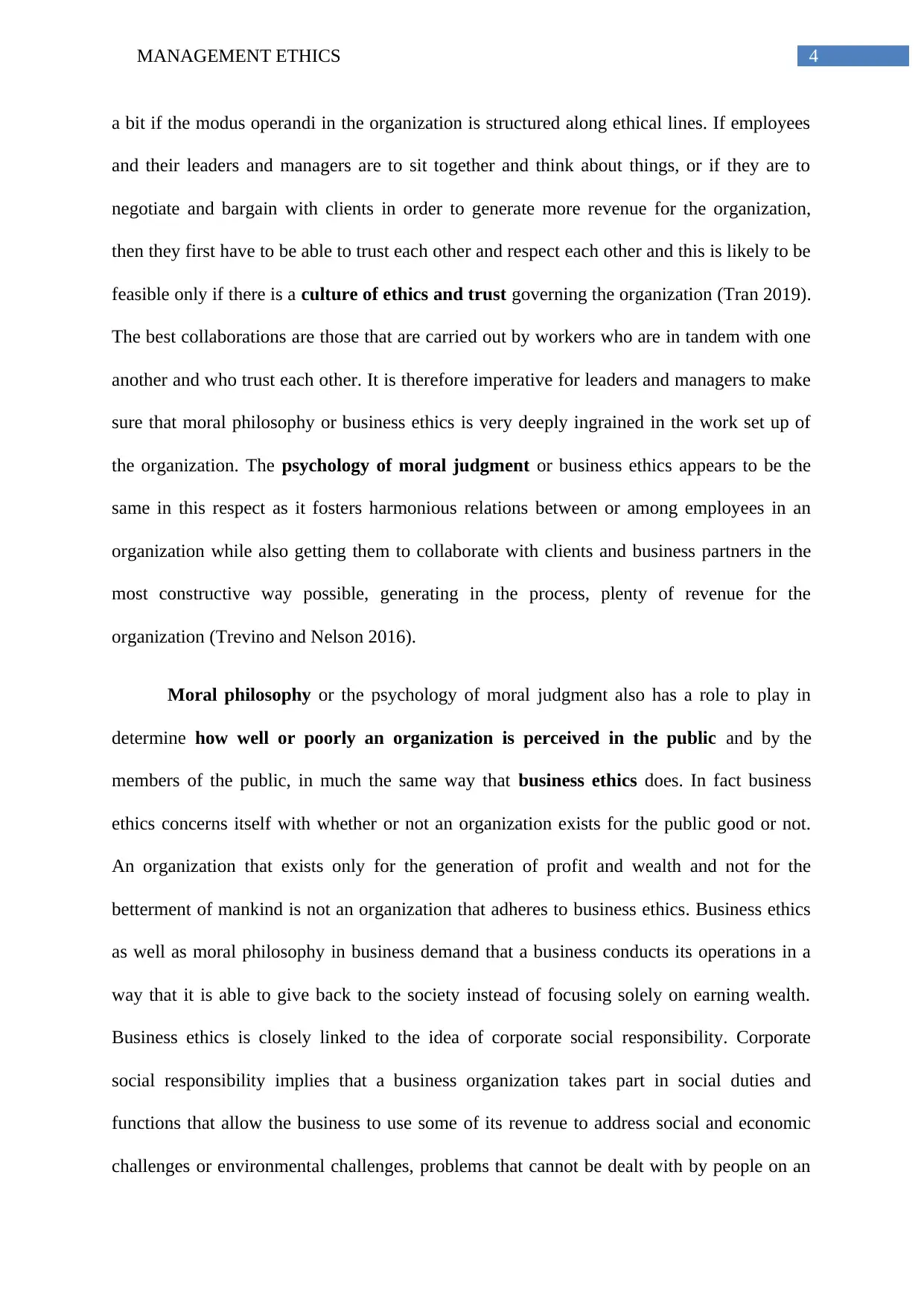
4MANAGEMENT ETHICS
a bit if the modus operandi in the organization is structured along ethical lines. If employees
and their leaders and managers are to sit together and think about things, or if they are to
negotiate and bargain with clients in order to generate more revenue for the organization,
then they first have to be able to trust each other and respect each other and this is likely to be
feasible only if there is a culture of ethics and trust governing the organization (Tran 2019).
The best collaborations are those that are carried out by workers who are in tandem with one
another and who trust each other. It is therefore imperative for leaders and managers to make
sure that moral philosophy or business ethics is very deeply ingrained in the work set up of
the organization. The psychology of moral judgment or business ethics appears to be the
same in this respect as it fosters harmonious relations between or among employees in an
organization while also getting them to collaborate with clients and business partners in the
most constructive way possible, generating in the process, plenty of revenue for the
organization (Trevino and Nelson 2016).
Moral philosophy or the psychology of moral judgment also has a role to play in
determine how well or poorly an organization is perceived in the public and by the
members of the public, in much the same way that business ethics does. In fact business
ethics concerns itself with whether or not an organization exists for the public good or not.
An organization that exists only for the generation of profit and wealth and not for the
betterment of mankind is not an organization that adheres to business ethics. Business ethics
as well as moral philosophy in business demand that a business conducts its operations in a
way that it is able to give back to the society instead of focusing solely on earning wealth.
Business ethics is closely linked to the idea of corporate social responsibility. Corporate
social responsibility implies that a business organization takes part in social duties and
functions that allow the business to use some of its revenue to address social and economic
challenges or environmental challenges, problems that cannot be dealt with by people on an
a bit if the modus operandi in the organization is structured along ethical lines. If employees
and their leaders and managers are to sit together and think about things, or if they are to
negotiate and bargain with clients in order to generate more revenue for the organization,
then they first have to be able to trust each other and respect each other and this is likely to be
feasible only if there is a culture of ethics and trust governing the organization (Tran 2019).
The best collaborations are those that are carried out by workers who are in tandem with one
another and who trust each other. It is therefore imperative for leaders and managers to make
sure that moral philosophy or business ethics is very deeply ingrained in the work set up of
the organization. The psychology of moral judgment or business ethics appears to be the
same in this respect as it fosters harmonious relations between or among employees in an
organization while also getting them to collaborate with clients and business partners in the
most constructive way possible, generating in the process, plenty of revenue for the
organization (Trevino and Nelson 2016).
Moral philosophy or the psychology of moral judgment also has a role to play in
determine how well or poorly an organization is perceived in the public and by the
members of the public, in much the same way that business ethics does. In fact business
ethics concerns itself with whether or not an organization exists for the public good or not.
An organization that exists only for the generation of profit and wealth and not for the
betterment of mankind is not an organization that adheres to business ethics. Business ethics
as well as moral philosophy in business demand that a business conducts its operations in a
way that it is able to give back to the society instead of focusing solely on earning wealth.
Business ethics is closely linked to the idea of corporate social responsibility. Corporate
social responsibility implies that a business organization takes part in social duties and
functions that allow the business to use some of its revenue to address social and economic
challenges or environmental challenges, problems that cannot be dealt with by people on an
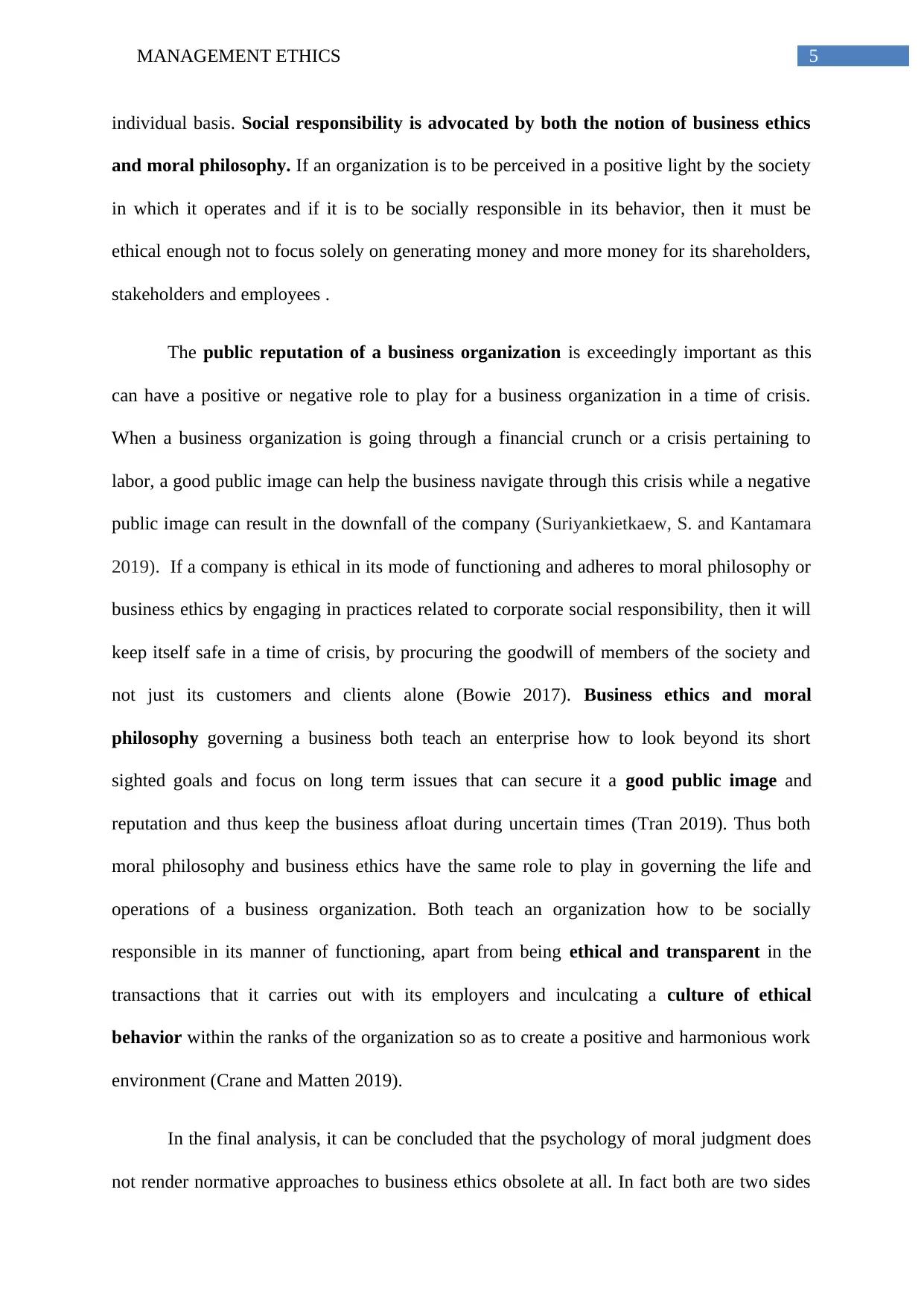
5MANAGEMENT ETHICS
individual basis. Social responsibility is advocated by both the notion of business ethics
and moral philosophy. If an organization is to be perceived in a positive light by the society
in which it operates and if it is to be socially responsible in its behavior, then it must be
ethical enough not to focus solely on generating money and more money for its shareholders,
stakeholders and employees .
The public reputation of a business organization is exceedingly important as this
can have a positive or negative role to play for a business organization in a time of crisis.
When a business organization is going through a financial crunch or a crisis pertaining to
labor, a good public image can help the business navigate through this crisis while a negative
public image can result in the downfall of the company (Suriyankietkaew, S. and Kantamara
2019). If a company is ethical in its mode of functioning and adheres to moral philosophy or
business ethics by engaging in practices related to corporate social responsibility, then it will
keep itself safe in a time of crisis, by procuring the goodwill of members of the society and
not just its customers and clients alone (Bowie 2017). Business ethics and moral
philosophy governing a business both teach an enterprise how to look beyond its short
sighted goals and focus on long term issues that can secure it a good public image and
reputation and thus keep the business afloat during uncertain times (Tran 2019). Thus both
moral philosophy and business ethics have the same role to play in governing the life and
operations of a business organization. Both teach an organization how to be socially
responsible in its manner of functioning, apart from being ethical and transparent in the
transactions that it carries out with its employers and inculcating a culture of ethical
behavior within the ranks of the organization so as to create a positive and harmonious work
environment (Crane and Matten 2019).
In the final analysis, it can be concluded that the psychology of moral judgment does
not render normative approaches to business ethics obsolete at all. In fact both are two sides
individual basis. Social responsibility is advocated by both the notion of business ethics
and moral philosophy. If an organization is to be perceived in a positive light by the society
in which it operates and if it is to be socially responsible in its behavior, then it must be
ethical enough not to focus solely on generating money and more money for its shareholders,
stakeholders and employees .
The public reputation of a business organization is exceedingly important as this
can have a positive or negative role to play for a business organization in a time of crisis.
When a business organization is going through a financial crunch or a crisis pertaining to
labor, a good public image can help the business navigate through this crisis while a negative
public image can result in the downfall of the company (Suriyankietkaew, S. and Kantamara
2019). If a company is ethical in its mode of functioning and adheres to moral philosophy or
business ethics by engaging in practices related to corporate social responsibility, then it will
keep itself safe in a time of crisis, by procuring the goodwill of members of the society and
not just its customers and clients alone (Bowie 2017). Business ethics and moral
philosophy governing a business both teach an enterprise how to look beyond its short
sighted goals and focus on long term issues that can secure it a good public image and
reputation and thus keep the business afloat during uncertain times (Tran 2019). Thus both
moral philosophy and business ethics have the same role to play in governing the life and
operations of a business organization. Both teach an organization how to be socially
responsible in its manner of functioning, apart from being ethical and transparent in the
transactions that it carries out with its employers and inculcating a culture of ethical
behavior within the ranks of the organization so as to create a positive and harmonious work
environment (Crane and Matten 2019).
In the final analysis, it can be concluded that the psychology of moral judgment does
not render normative approaches to business ethics obsolete at all. In fact both are two sides
⊘ This is a preview!⊘
Do you want full access?
Subscribe today to unlock all pages.

Trusted by 1+ million students worldwide
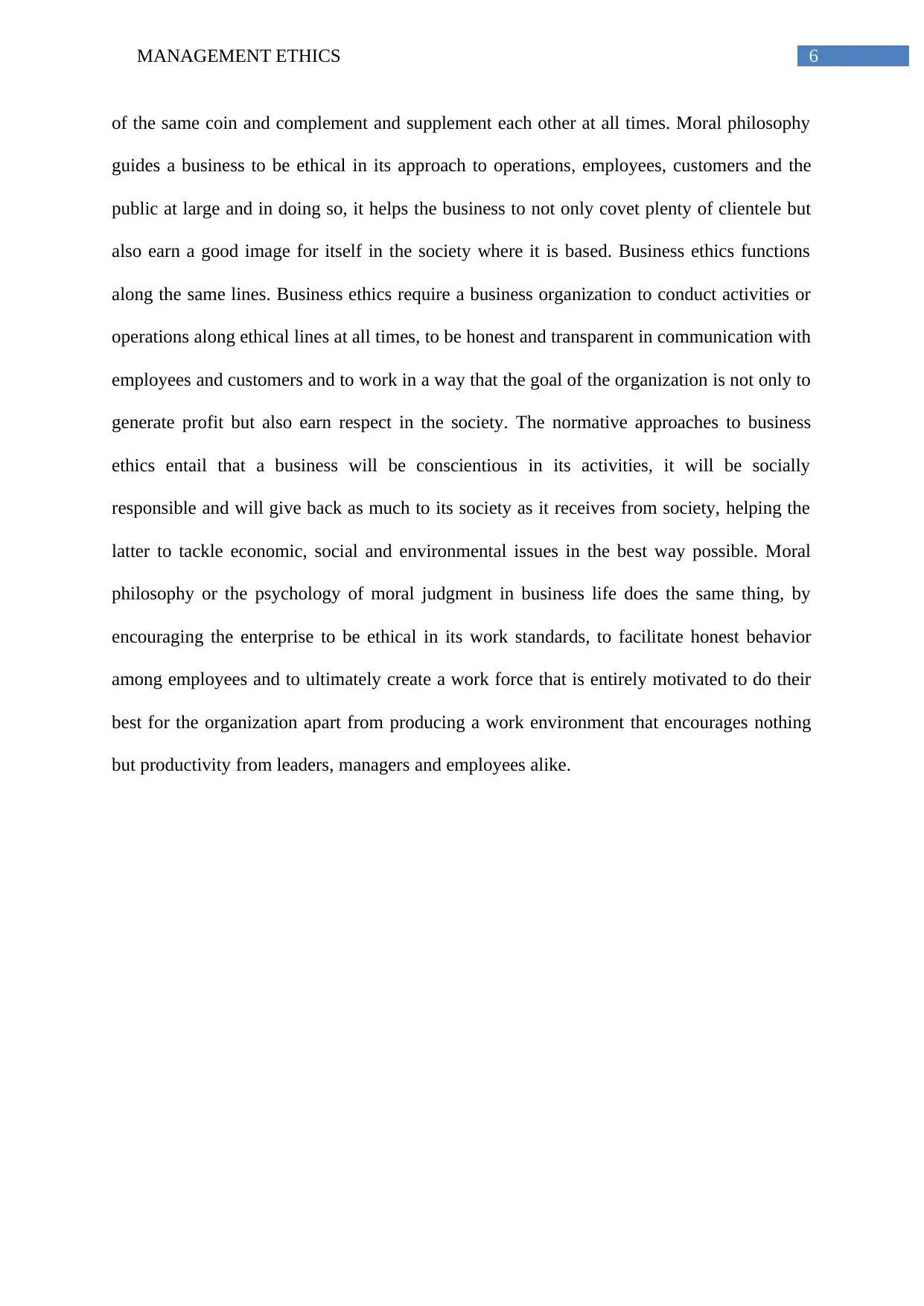
6MANAGEMENT ETHICS
of the same coin and complement and supplement each other at all times. Moral philosophy
guides a business to be ethical in its approach to operations, employees, customers and the
public at large and in doing so, it helps the business to not only covet plenty of clientele but
also earn a good image for itself in the society where it is based. Business ethics functions
along the same lines. Business ethics require a business organization to conduct activities or
operations along ethical lines at all times, to be honest and transparent in communication with
employees and customers and to work in a way that the goal of the organization is not only to
generate profit but also earn respect in the society. The normative approaches to business
ethics entail that a business will be conscientious in its activities, it will be socially
responsible and will give back as much to its society as it receives from society, helping the
latter to tackle economic, social and environmental issues in the best way possible. Moral
philosophy or the psychology of moral judgment in business life does the same thing, by
encouraging the enterprise to be ethical in its work standards, to facilitate honest behavior
among employees and to ultimately create a work force that is entirely motivated to do their
best for the organization apart from producing a work environment that encourages nothing
but productivity from leaders, managers and employees alike.
of the same coin and complement and supplement each other at all times. Moral philosophy
guides a business to be ethical in its approach to operations, employees, customers and the
public at large and in doing so, it helps the business to not only covet plenty of clientele but
also earn a good image for itself in the society where it is based. Business ethics functions
along the same lines. Business ethics require a business organization to conduct activities or
operations along ethical lines at all times, to be honest and transparent in communication with
employees and customers and to work in a way that the goal of the organization is not only to
generate profit but also earn respect in the society. The normative approaches to business
ethics entail that a business will be conscientious in its activities, it will be socially
responsible and will give back as much to its society as it receives from society, helping the
latter to tackle economic, social and environmental issues in the best way possible. Moral
philosophy or the psychology of moral judgment in business life does the same thing, by
encouraging the enterprise to be ethical in its work standards, to facilitate honest behavior
among employees and to ultimately create a work force that is entirely motivated to do their
best for the organization apart from producing a work environment that encourages nothing
but productivity from leaders, managers and employees alike.
Paraphrase This Document
Need a fresh take? Get an instant paraphrase of this document with our AI Paraphraser
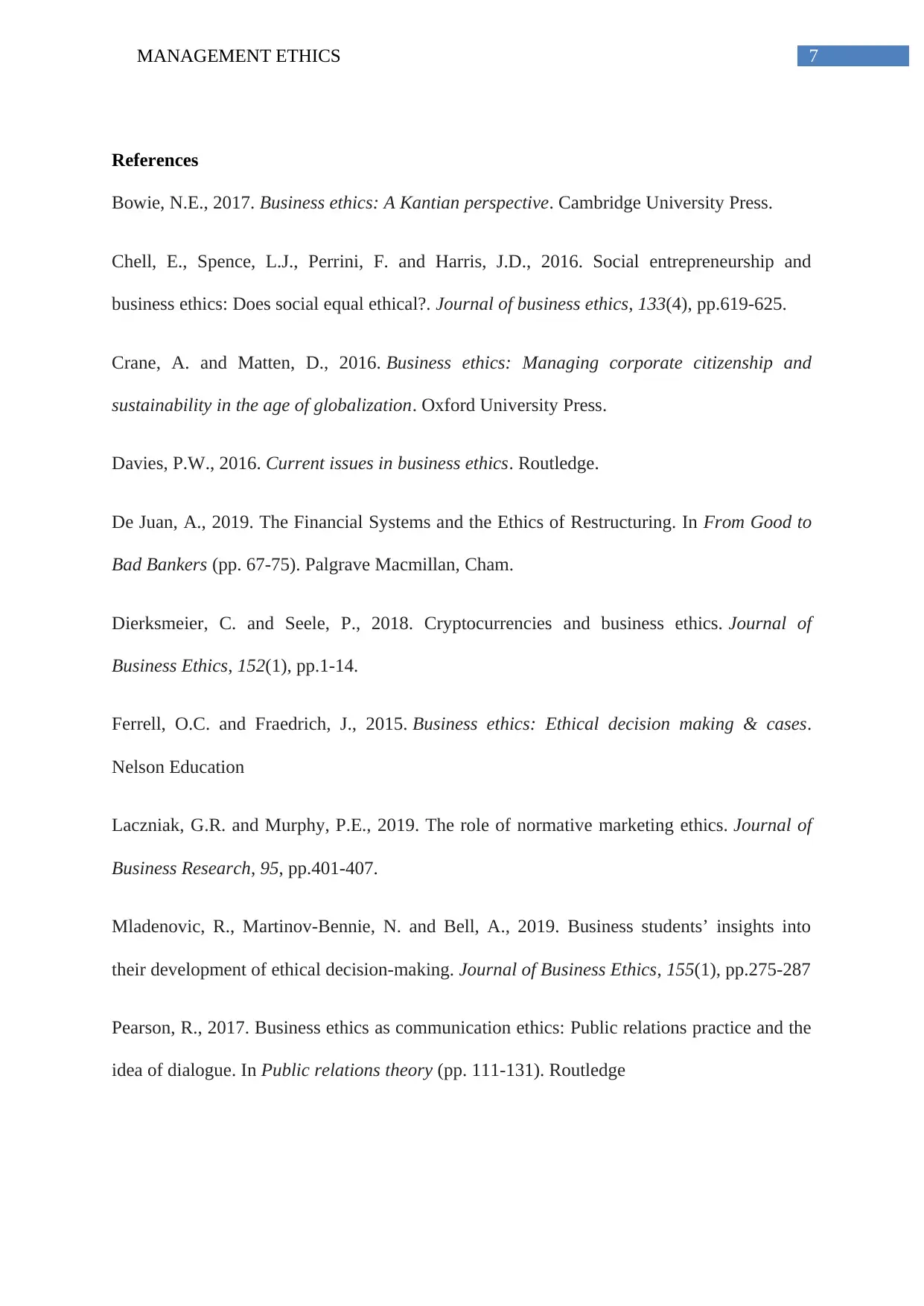
7MANAGEMENT ETHICS
References
Bowie, N.E., 2017. Business ethics: A Kantian perspective. Cambridge University Press.
Chell, E., Spence, L.J., Perrini, F. and Harris, J.D., 2016. Social entrepreneurship and
business ethics: Does social equal ethical?. Journal of business ethics, 133(4), pp.619-625.
Crane, A. and Matten, D., 2016. Business ethics: Managing corporate citizenship and
sustainability in the age of globalization. Oxford University Press.
Davies, P.W., 2016. Current issues in business ethics. Routledge.
De Juan, A., 2019. The Financial Systems and the Ethics of Restructuring. In From Good to
Bad Bankers (pp. 67-75). Palgrave Macmillan, Cham.
Dierksmeier, C. and Seele, P., 2018. Cryptocurrencies and business ethics. Journal of
Business Ethics, 152(1), pp.1-14.
Ferrell, O.C. and Fraedrich, J., 2015. Business ethics: Ethical decision making & cases.
Nelson Education
Laczniak, G.R. and Murphy, P.E., 2019. The role of normative marketing ethics. Journal of
Business Research, 95, pp.401-407.
Mladenovic, R., Martinov-Bennie, N. and Bell, A., 2019. Business students’ insights into
their development of ethical decision-making. Journal of Business Ethics, 155(1), pp.275-287
Pearson, R., 2017. Business ethics as communication ethics: Public relations practice and the
idea of dialogue. In Public relations theory (pp. 111-131). Routledge
References
Bowie, N.E., 2017. Business ethics: A Kantian perspective. Cambridge University Press.
Chell, E., Spence, L.J., Perrini, F. and Harris, J.D., 2016. Social entrepreneurship and
business ethics: Does social equal ethical?. Journal of business ethics, 133(4), pp.619-625.
Crane, A. and Matten, D., 2016. Business ethics: Managing corporate citizenship and
sustainability in the age of globalization. Oxford University Press.
Davies, P.W., 2016. Current issues in business ethics. Routledge.
De Juan, A., 2019. The Financial Systems and the Ethics of Restructuring. In From Good to
Bad Bankers (pp. 67-75). Palgrave Macmillan, Cham.
Dierksmeier, C. and Seele, P., 2018. Cryptocurrencies and business ethics. Journal of
Business Ethics, 152(1), pp.1-14.
Ferrell, O.C. and Fraedrich, J., 2015. Business ethics: Ethical decision making & cases.
Nelson Education
Laczniak, G.R. and Murphy, P.E., 2019. The role of normative marketing ethics. Journal of
Business Research, 95, pp.401-407.
Mladenovic, R., Martinov-Bennie, N. and Bell, A., 2019. Business students’ insights into
their development of ethical decision-making. Journal of Business Ethics, 155(1), pp.275-287
Pearson, R., 2017. Business ethics as communication ethics: Public relations practice and the
idea of dialogue. In Public relations theory (pp. 111-131). Routledge
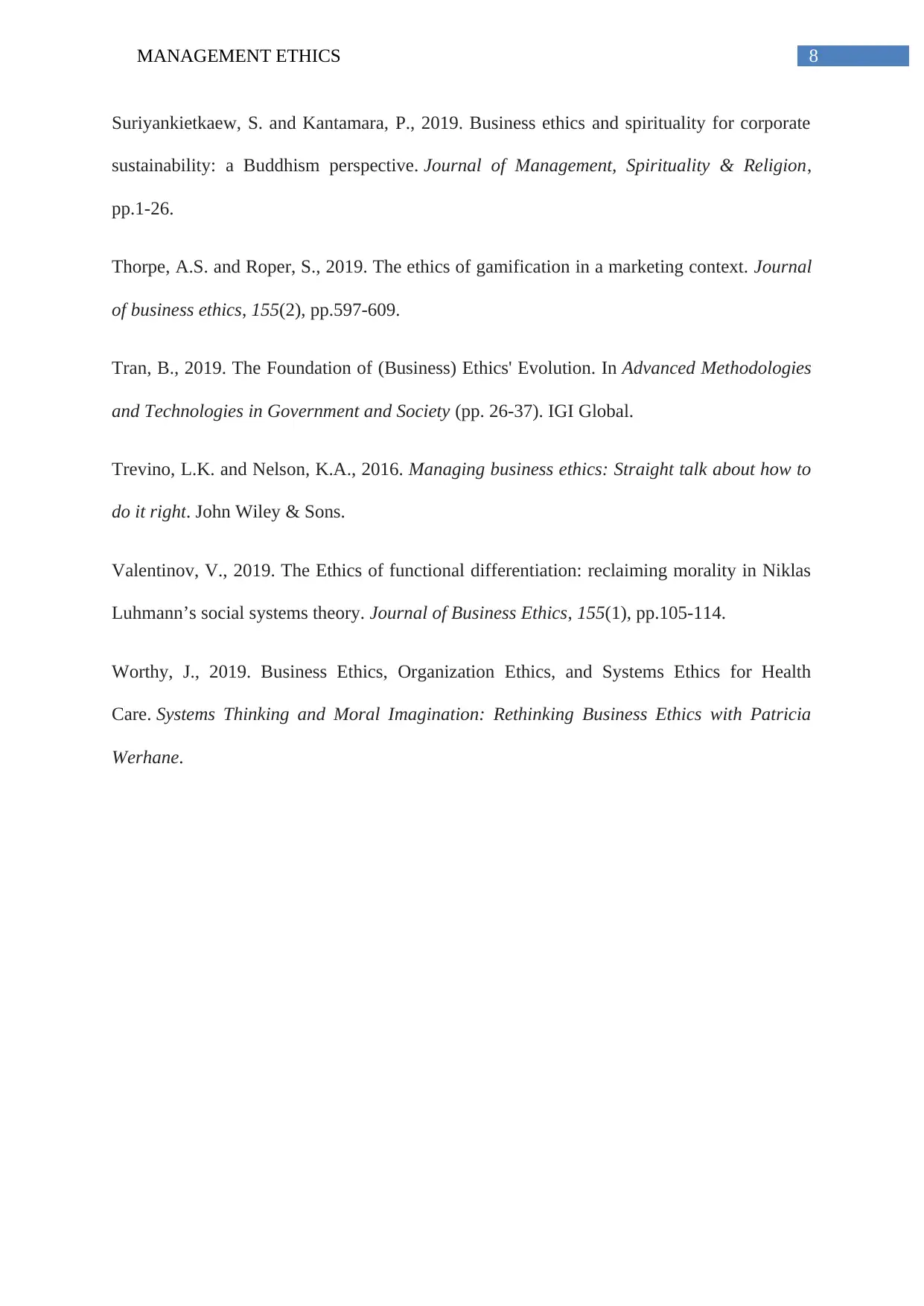
8MANAGEMENT ETHICS
Suriyankietkaew, S. and Kantamara, P., 2019. Business ethics and spirituality for corporate
sustainability: a Buddhism perspective. Journal of Management, Spirituality & Religion,
pp.1-26.
Thorpe, A.S. and Roper, S., 2019. The ethics of gamification in a marketing context. Journal
of business ethics, 155(2), pp.597-609.
Tran, B., 2019. The Foundation of (Business) Ethics' Evolution. In Advanced Methodologies
and Technologies in Government and Society (pp. 26-37). IGI Global.
Trevino, L.K. and Nelson, K.A., 2016. Managing business ethics: Straight talk about how to
do it right. John Wiley & Sons.
Valentinov, V., 2019. The Ethics of functional differentiation: reclaiming morality in Niklas
Luhmann’s social systems theory. Journal of Business Ethics, 155(1), pp.105-114.
Worthy, J., 2019. Business Ethics, Organization Ethics, and Systems Ethics for Health
Care. Systems Thinking and Moral Imagination: Rethinking Business Ethics with Patricia
Werhane.
Suriyankietkaew, S. and Kantamara, P., 2019. Business ethics and spirituality for corporate
sustainability: a Buddhism perspective. Journal of Management, Spirituality & Religion,
pp.1-26.
Thorpe, A.S. and Roper, S., 2019. The ethics of gamification in a marketing context. Journal
of business ethics, 155(2), pp.597-609.
Tran, B., 2019. The Foundation of (Business) Ethics' Evolution. In Advanced Methodologies
and Technologies in Government and Society (pp. 26-37). IGI Global.
Trevino, L.K. and Nelson, K.A., 2016. Managing business ethics: Straight talk about how to
do it right. John Wiley & Sons.
Valentinov, V., 2019. The Ethics of functional differentiation: reclaiming morality in Niklas
Luhmann’s social systems theory. Journal of Business Ethics, 155(1), pp.105-114.
Worthy, J., 2019. Business Ethics, Organization Ethics, and Systems Ethics for Health
Care. Systems Thinking and Moral Imagination: Rethinking Business Ethics with Patricia
Werhane.
⊘ This is a preview!⊘
Do you want full access?
Subscribe today to unlock all pages.

Trusted by 1+ million students worldwide
1 out of 9
Related Documents
Your All-in-One AI-Powered Toolkit for Academic Success.
+13062052269
info@desklib.com
Available 24*7 on WhatsApp / Email
![[object Object]](/_next/static/media/star-bottom.7253800d.svg)
Unlock your academic potential
Copyright © 2020–2026 A2Z Services. All Rights Reserved. Developed and managed by ZUCOL.





